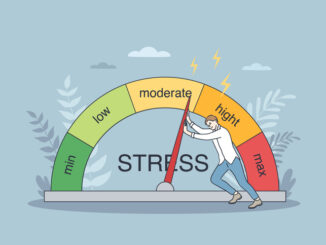
It’s time we recognised that how we might look to others does not dictate how we should feel about ourselves
CREDIT: This is an edited version of an article that originally appeared on Happiful
Beauty – or rather, the socially constructed appearance norms that are assigned the label of ‘beautiful’ – has long been framed as a measure of worth. From a young age, we’re faced with an onslaught of idealised images, and taught to appraise aesthetics as central to our status and identity.
Lifelong exposure to unattainable body ideals leads many of us to develop an all-consuming preoccupation with our own appearance, basing our feelings of worth on what we see in the mirror. This is known as ‘having appearance-contingent self-worth’. Those whose self-worth hinges upon their appearance are more likely to internalise the gaze of spectators, resulting in an objectified body consciousness.
This means that we view ourselves not as a whole person, but as an object existing for the visual gratification of others. We seek recognition not for our individuality, creativity, generosity or kindness, but for our alignment with beauty standards, beating ourselves up when we inevitably fall short.
In a society that places tremendous emphasis on aesthetic traits, and teaches us that physical appearance is the currency in which we trade for love, success and acceptance, disentangling our sense of worth from how we look is by no means easy. Recalibrating our self-perception to derive value from more than our bodies defies what we’ve been told about how our image-obsessed world works.
While it’s difficult to challenge the culturally salient belief that our bodies are the most important thing about us, doing so is also hugely liberating; by disrupting the influence that appearance standards have over us we gain back valuable time and energy to channel into other activities that can enrich our lives. Here are some ways we can get started down the path of accepting ourselves, and recognising our true worth.
Prioritise positive self-talk
It’s easy for the conversations we have with ourselves to be swayed by our cultural tendency to critique and criticise. Self-directed body shame can feel like second nature when the world has programmed us to believe that we’re ‘not enough’. However, it goes without saying that launching verbal assaults on our bodies does no good for our mood or self-esteem.
Instead of perpetuating a pattern of negative self-talk, try to nurture a more encouraging and supportive inner dialogue. Notice when you begin to ruminate over negative body thoughts, and make a conscious effort to say one positive non-appearance related thing about yourself. Remind yourself that you are more than a body, and you don’t exist for the viewing pleasure of others; you have so much more to offer the world than how you look. Though it might feel a little uncomfortable at first, the more you practise speaking positively about yourself, the easier positive self-talk will become.
Limit social comparison
There’s no denying that our society is set up to provoke comparison; with social media and influencer culture constantly presenting us with a curated feed of highly-stylised content that sits in stark contrast to our own, imperfect, day-to-day reality, we’re often compelled to compare ourselves to these idealised versions of life.
If you regularly compare yourself to others online it may be worth minimising the opportunities you have to engage in this. Set yourself a limit on how much time you spend on social media, and unfollow people who make you feel negatively about yourself. Fill your feed with content that doesn’t centre on physical appearance, and remind yourself that there is always more to what we see on the internet than meets the eye.
Focus on self-care
With every industry, from wellness and beauty, to stationery and home decor, adopting the capitalist command to ‘treat yourself,’ self-care has become a bit of a buzzword in marketing living luxuriously; however, engaging in self-care is about so much more than bubble baths, and building a ‘hygge’ home.
In her book, A Burst of Light, poet and activist Audre Lorde writes, “Caring for myself is not self-indulgence, it is self-preservation, and that is an act of political warfare.” Confronting issues relating to civil rights, disability and explorations of black queer female identity through her work, Lorde speaks of periods of rest and respite as integral to survival in the face of adversity and injustice.
Body ideals are undeniably political; they’re entrenched in wider structures of oppression and discrimination, intent on keeping marginalised identities small, silent and subordinate. When we abandon the cycle of shame and self-punishment that arises from appearance-contingent self-worth, and pledge to care for ourselves, we are not only preserving our wellbeing, we are also engaging in an act of resistance.
Practise self-compassion
After a lifetime of being taught that our appearance determines our worth, it can be difficult to unlearn this belief; we are, after all, shaped by the culture we live within, and rejecting this tyranny of aesthetics can feel like a total worldview overhaul.
If you find yourself struggling to not allow how you feel about your appearance dictate how you feel about yourself from time-to-time, don’t beat yourself up for it. Show compassion; you are doing your best – not every moment will be filled with an abundance of unadulterated self-love.
But every second you strive to know your worth beyond your appearance is a triumph that is worthy of celebration.



Be the first to comment